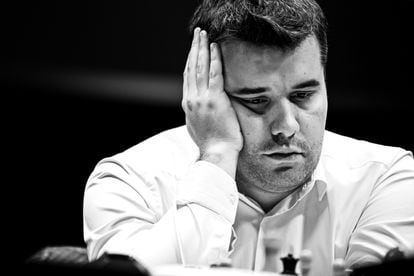“Chess is the most violent sport”, said the Spaniard Ricardo Calvo (1943-2002), a leading figure of the 20th century.
The World Cup in Astana (Kazakhstan) between Ian Niepómniashi and Liren Ding proves him right.
One day after the Russian won the fifth game after losing the fourth, the Chinese won the sixth and evened the score (3-3).
You have to go back to 1981 (Kárpov-Korchnói) to find another duel for the title with four victories in six rounds.
The seventh is scheduled for Monday.
Calvo's statement -high-level player, historian, writer and doctor- makes full sense when it is known that, contrary to football or many other sports, the chess player cannot relieve the tremendous tension of a four or five hour game while the play.
It is forbidden for Ding and Niepómniashi to talk to anyone, and shouting would be highly frowned upon even if they do it in their dressing rooms, where there are also remote-controlled cameras.
And it would be ridiculous to blame a loss on the referee because, in chess, it is almost impossible for his decisions to alter a result.
Whoever loses knows that the cause is his mistakes and the opponent's successes, there is no more.
"Today I played the worst game of my life," Niepómniashi declared, a few minutes after his surrender.
He obviously exaggerated a lot because what happened was more like Ding put him in a straitjacket, increasing the pressure for four hours with great skill.
It is true that he omitted the best defenses, but also that they were very difficult for a human being to see and calculate, even though the computers that process millions of plays per second capture them in a jiffy.
That phrase reflected the state of mind of the Russian at that moment.
EL PAÍS then asked him if there was a logical explanation for his stumble 24 hours after a victory of enormous psychological importance (he won the fifth after losing the fourth) since recovering from defeats has always been Niepómniashi's weakest point.
After a deep breath, he replied: “The tension is very great.
Yesterday's self-esteem boost may have been reflected in today's overconfidence."
Niepómniashi thinks about one of his moves during the 6th game of the World CupAnna Shtourmann/FIDE
On the other hand, Ding's psychological strength seems herculean: depressed after the first two rounds, confident in the third, triumphant in the fourth, defeated in the fifth, and crushing in the sixth.
"I have managed to make yesterday's defeat not affect me," he said.
But the big question in the air is how to achieve that in a sport where self-esteem is a roller coaster.
Above all, in this specific duel.
We must go back to a very famous rivalry, that of the Soviet national superhero Anatoli Kárpov against the "traitor" (dissident escaped from the Soviet Union) Víktor Korchnói in their second duel for the throne (Merano, Italy; 1981), to find four victories in the first six games.
But even that confrontation was not so exciting, because Kárpov won 4-2, and there were not three consecutive victories, like now.
Asked both about it, the Slav, with an enormous desire to disappear from the spotlight, postponed his answer "for another day."
The Asian contributed an idea of great interest: “In general, in these six games we have barely played computer openings [first moves], with many moves from memory.
We got off the well-analyzed paths rather early, and that reduces the probability of a draw”.
This answer shows that chess between humans has a future, even if the best player in the world has been a machine for about twenty years.
Just like nobody would think of including a Formula 1 car in a 100-meter dash, and athletics still has millions of fans, so does chess.
On social networks, more and more comments are seen in the same direction: in Astana, the still world champion, the Norwegian Magnus Carlsen, does not play in Astana, whose style is quite similar to that of a computer;
but Niepómniashi and Ding's fights are much more exciting for an average fan than Carlsen's against the Russian Sergei Kariakin (New York, 2016) and the American Fabiano Caruana (London, 2018), as technically refined as they are largely soporific.
Chess is, above all, a combat sport, even if it has some science, art and educational tool.
And, finally, there is a duel for the title that corroborates it.
Subscribe to the
weekly newsletter 'Maravillosa jugada',
by Leontxo García
Subscribe to continue reading
Read without limits
Keep reading
I'm already a subscriber

